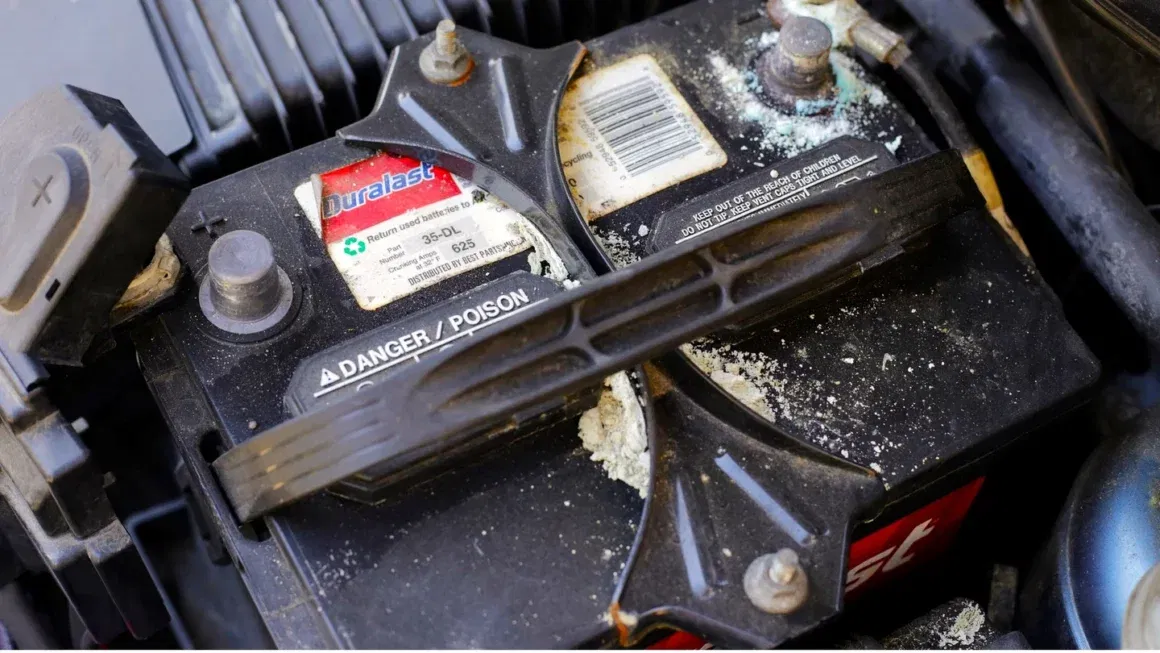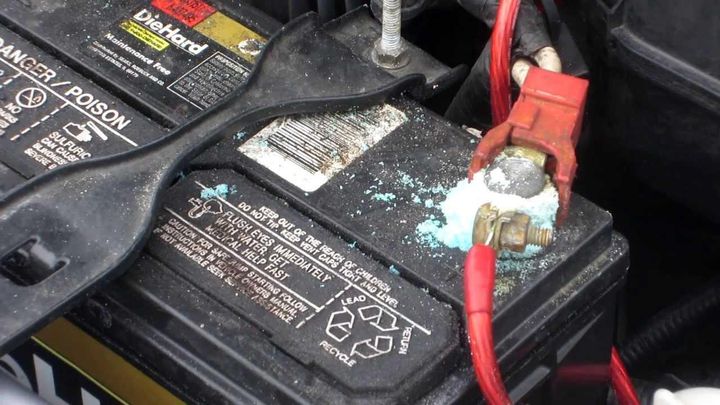


As an experienced automotive mechanic, I've encountered countless situations where car owners have faced the frustrating issue of a leaking battery. It's a common problem that can cause significant damage if left unaddressed, but fear not, my fellow drivers! In this comprehensive guide, I'll delve into the intricacies of identifying, fixing, and preventing a leaking car battery, drawing from my years of hands-on experience in the automotive industry.

Before we dive into the solutions, it's crucial to understand the root causes of a leaking car battery. The most common culprits are outlined in the following table:
| Cause | Description |
|---|---|
| Aging and Wear | As the battery gets older, the casing can develop cracks or holes, allowing the electrolyte solution to leak out. This is typically seen in older batteries that have been in use for several years. |
| Physical Damage | Impacts or mishandling can cause cracks or damage to the battery casing, leading to leaks. This is often seen if the battery was dropped or improperly installed. |
| Overcharging | If the battery is overcharged, excessive heat can cause the electrolyte to boil and leak out through the vent caps. This is usually caused by issues with the vehicle's charging system. |
It's essential to identify the root cause of the leak to address the issue effectively and prevent future occurrences.
Before attempting any repairs, you'll need to confirm that your car battery is indeed leaking. Here are the telltale signs to look out for:

Carefully examine the battery for any signs of fluid leakage, cracks, or damage to the casing. Don't forget to check the area around the battery, as leaks can leave residue or corrosion on nearby components.
If you notice a distinct, pungent odor emanating from the battery area, it could be a sign of a leak. The electrolyte solution has a distinct smell that's hard to miss.
Leaking electrolyte can cause corrosion to build up around the battery terminals, leaving a crusty, bluish-white residue.
If you notice any of these signs, it's time to take action and address the leak before it causes further damage to your vehicle.
Once you've confirmed that your battery is leaking, follow these steps to safely and effectively fix the issue:
Remove the Battery: First and foremost, remove the battery from the vehicle and move it to a well-ventilated area. The leaked electrolyte can produce hazardous fumes, so proper ventilation is crucial for your safety.
Neutralize the Leak: Use a solution of baking soda and water to neutralize the leaked acid. This will help to safely clean up the spill and prevent further damage to surrounding components.
Mix one part baking soda with three parts water to create a neutralizing solution.
Apply the solution to the affected area and let it sit for a few minutes to neutralize the acid.
Wipe away the solution and any residue with a clean cloth or paper towels.
Inspect the Casing: Carefully inspect the battery casing for cracks or damage. If the damage is minor, you may be able to patch it using a sealant designed specifically for batteries.
Replace or Patch: If the damage to the casing is significant or if the battery is older, it's recommended to replace it with a new one to ensure proper operation and safety. However, if the damage is minor, you can opt to patch the battery using a sealant, which can be a more cost-effective solution.
Follow the manufacturer's instructions for applying the sealant to the affected area.
Allow the sealant to cure completely before reinstalling the battery.
Proper Installation: When installing a new battery or reinstalling the patched one, be sure to properly secure it and connect the cables to prevent future leaks or issues.
Ensure the battery tray or mounting bracket is clean and free of corrosion.
Secure the battery using the appropriate hold-down clamp or bracket.
Connect the positive (red) cable first, followed by the negative (black) cable.
As the saying goes, "an ounce of prevention is worth a pound of cure." To prevent future leaks and extend the life of your car's battery, follow these simple maintenance tips:
Regular Inspections: Regularly check the battery and connections for any signs of corrosion, damage, or leaks. Catching issues early can save you from more significant problems down the road.
Clean Terminals: Keep the battery terminals clean and free of corrosion. This will ensure proper electrical connections and prevent potential leaks.
Use a wire brush or baking soda solution to remove any corrosion buildup.
Apply a thin layer of dielectric grease to the terminals to prevent future corrosion.
Secure Mounting: Ensure that the battery is properly secured to prevent vibrations and movement during operation, which can lead to damage and leaks over time.
Follow Manufacturer Guidelines: Adhere to the manufacturer's recommendations for battery maintenance and replacement intervals. Replacing an aging battery before it fails can save you from costly repairs and inconvenient breakdowns.
Dealing with a leaking car battery can be a frustrating and potentially hazardous situation, but with the right knowledge and precautions, it's a problem that can be easily addressed. By following the steps outlined in this comprehensive guide, you can safely fix a leaking battery, prevent future leaks, and extend the lifespan of your vehicle's battery.
Remember, proper maintenance and addressing issues promptly are key to minimizing the costs associated with battery leaks. Whether you choose to patch or replace the battery, prioritize safety and seek professional assistance if you're unsure about any step of the process.
Happy motoring, and may your batteries remain leak-free and reliable for years to come!
The most common causes of a leaking car battery are aging and wear, physical damage to the casing, and overcharging which can cause the electrolyte solution to boil and leak out.
You can identify a leaking battery by visually inspecting for fluid leaks or cracks in the casing, noticing unusual odors coming from the battery area, and checking for corrosion buildup around the terminals.
No, it is not safe to drive with a leaking car battery as the leaked electrolyte solution can be hazardous and cause further damage to your vehicle's components.
Minor cracks or holes in the battery casing can potentially be patched using a sealant designed specifically for batteries, but significant damage will require replacing the battery entirely.
You can neutralize a battery acid leak by using a solution of baking soda and water, applying it to the affected area, and wiping away the solution and any residue with a clean cloth.
It is recommended to regularly inspect your car battery and connections for any signs of corrosion, damage, or leaks to catch issues early and prevent more significant problems.
Ensure the battery tray or mounting bracket is clean, secure the battery using the appropriate hold-down clamp or bracket, and connect the positive cable first, followed by the negative cable.
The typical lifespan of a car battery varies by type, with lead-acid batteries lasting 3-5 years, AGM batteries lasting 5-7 years, and gel batteries lasting 6-10 years.
To prevent future battery leaks, keep the terminals clean and free of corrosion, ensure the battery is properly secured to prevent vibrations and movement, and follow the manufacturer's recommendations for maintenance and replacement intervals.
If you are unsure about any step of the process or if the battery damage is significant, it is recommended to seek professional assistance from a qualified mechanic or automotive service center.

Sarah isn't your average gearhead. With a double major in Mechanical Engineering and Automotive Technology, she dived straight into the world of car repair. After 15 years of turning wrenches at dealerships and independent shops, Sarah joined MICDOT to share her expertise and passion for making cars run like new. Her in-depth knowledge and knack for explaining complex issues in simple terms make her a valuable asset to our team.












